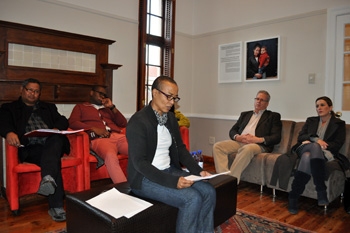
Dr Shirley Tate during her seminar on colour-blind racism.
Photo: O'Ryan Heideman
|
A prominent researcher and academic, Dr Shirley Tate, recently delivered an academic paper – soon to be published – on racism at institutions of higher learning in the United Kingdom. The seminar was hosted at the Bloemfontein and Qwaqwa Campus by the Institute for Reconciliation and Social Justice.
Dr Tate spoke about colour-blind racism – where racism at an interpersonal level, racial differences and ethnic particularities are overlooked. Colour-blind racism continues to negate the fact that skin colour has consequences in societies where it has been claimed that 'race' no longer matters.
Dr Tate, author of two books, is particularly interested in exploring the intersections of 'raced' and gendered bodies, race performativity, critical mixed race and racism in organisations.
Her talk sparked a lot of interest from both students and staff who were extremely keen to find out more about her extensive research and its striking similarities to our South African experience.
Dr Tate is an Associate Professor in Race and Culture and Director of the Centre for Ethnicity and Racism Studies at the University of Leeds in the United Kingdom.